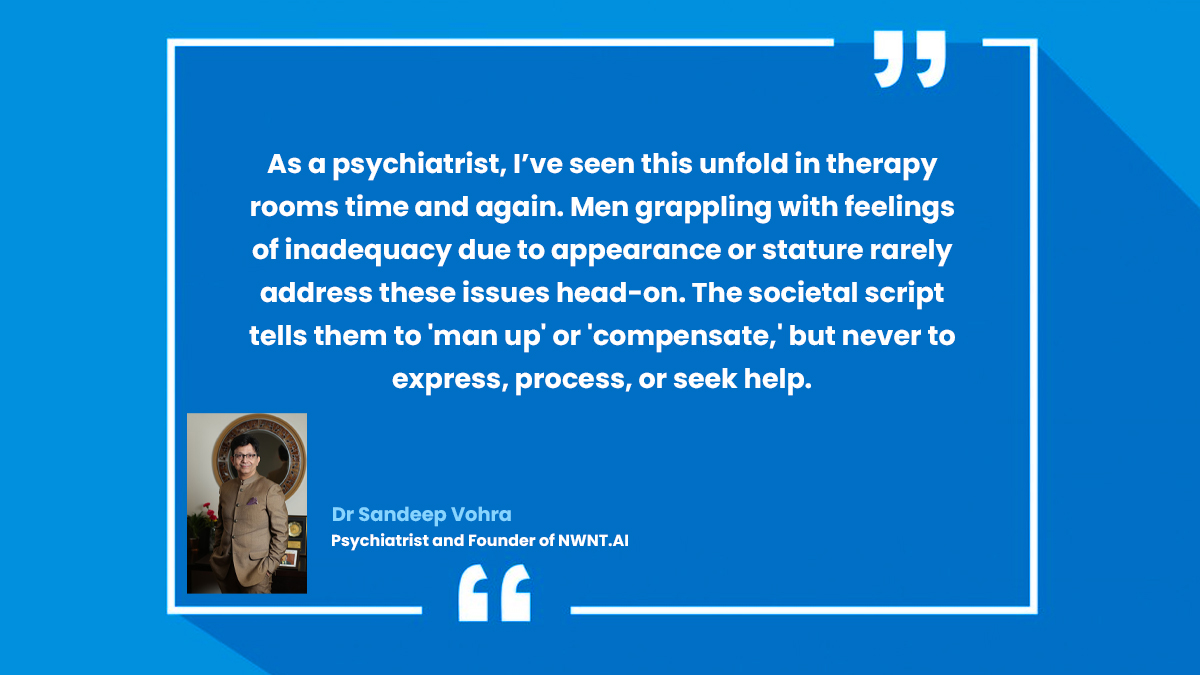
We’ve all met someone like this—a colleague who has to win every argument, a friend who turns a friendly game into a battle, or that driver who overtakes you to slow down in front of you.
Table of Content:-
CHECK YOUR
MENTAL HEALTH

Often, these moments are brushed off with a laugh and the label “Little Man Syndrome,” aimed at shorter men who seem overly assertive or competitive. It has casually made its way from internet memes to coffee-table conversations, and is often used to ridicule shorter men who display dominant, competitive, or aggressive behaviour.
But behind the jokes and internet memes is a much more human story, one about how society links masculinity to size, how that shapes confidence, and how some men end up carrying an invisible weight of having to prove themselves over and over again.
This week in our 'Mental Health Matters' series, we spoke to Dr Sandeep Vohra, Psychiatrist and Founder of NWNT.AI, who explained the psychology behind this syndrome and how it shapes your personality.
What Is Little Man Syndrome?

“Traditionally known as the 'Napoleon Complex,' this type of behavior implies that certain men, especially shorter ones, might compensate for their lack of height with over-the-top confidence or aggression. Although this is the stereotype propagated by popular culture, the scientific study shows otherwise,” said Dr Vohra.
What the Research Says
For instance, researchers found that shorter men were initially more likely to be convicted of violent crimes, but once adjusted for intelligence and other confounders, height had little direct effect on violent behaviour. Intelligence emerged as a stronger predictor.
A 2018 evolutionary psychology study revisited the idea with a fresh lens. Using financial games like the dictator and ultimatum games, it found that shorter men tended to take (or keep) more in competitive scenarios, particularly when facing taller rivals, but not by acting aggressively. Instead, these behaviours pointed more toward indirect competition strategies.
In contrast, a 2025 APA journal article notes that perceived or real threats to masculinity, rather than physical traits like height, often drive defensive behaviours or hyper-masculine responses.
Also Read: Hidden Signs of Depression in Men: Expert Shares Lesser-Known Signs You Shouldn't Ignore
The Reality of Height Bias
Height bias is very real, especially in cultures like India, where masculinity is often associated with tallness, dominance, and command. Shorter men may face subtle and not-so-subtle social penalties, ranging from dating rejection and workplace exclusion to childhood bullying.
According to the Sage Journal, taller people are perceived as more leader-like via dominance/health/intelligence cues.
Another 2004 study highlighted that height correlates with social esteem (ρ≈.41), leader emergence (ρ≈.24), performance (ρ≈.18)
The emotional toll of this kind of bias often manifests not in rage but in perfectionism, hyperachievement, or the need to constantly prove one’s worth. These behaviours are sometimes mistaken for arrogance or hostility, but they are often defensive strategies born of chronic insecurity and repeated social invalidation.
Message From The Expert

As a psychiatrist, I’ve seen this unfold in therapy rooms time and again. Men grappling with feelings of inadequacy due to appearance or stature rarely address these issues head-on. The societal script tells them to 'man up' or 'compensate,' but never to express, process, or seek help.
This means high-achieving professionals and leaders who are chronically anxious, emotionally numb, or burning under the unsustainable weight of unexpressed self-doubt. The problem isn't height; it's equating masculinity with dominance, control, and physical height.
Also Read: Mental Health Matters: The Impact Of Mockery And Trends On Self-Esteem Of Girls
Beyond the Stereotype: The Real Problem
What we might refer to as 'Little Man Syndrome' is not so much a psychological condition as an indication of how masculinity has been distorted into performance. “Not only is it unjust to those who might feel targeted by it, but also it's dangerous in what it does in perpetuating silence and shame. Rather than reinforcing this stereotype, we need to be discussing how to create emotional safety for all men, regardless of physical appearance, so that they won't feel the need to overcompensate in the first place,” said Dr Vohra.
To move forward,we need to normalise therapy and vulnerability in men, debunk the belief that height correlates with leadership or strength, and create better models of masculinity. Mocking men for overcompensation without asking what they’re compensating for does more harm than good. Emotional pain, when ignored or mocked, rarely disappears; it simply morphs into behaviour that is misunderstood or misjudged.
Bottomline
Dr Vohra concluded, “Little man syndrome is not a joke. It is a cultural signal that we are still measuring men by the wrong standards. Behind the posturing may be a man who has been told, explicitly or implicitly, that he must shout louder, perform harder, or take up more space just to be seen. Rather than pathologise these responses, it’s time we meet them with empathy, and start asking better questions about what it means to feel enough.”
[Disclaimer: This article contains information provided by an expert and is for informational purposes only. Hence, we advise you to consult your professional if you are dealing with any health issue to avoid complications.]
How we keep this article up to date:
We work with experts and keep a close eye on the latest in health and wellness. Whenever there is a new research or helpful information, we update our articles with accurate and useful advice.
Current Version
